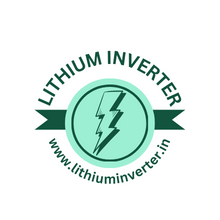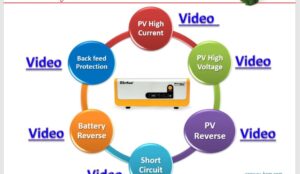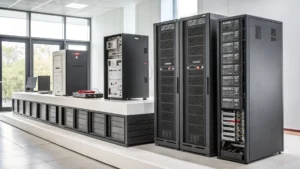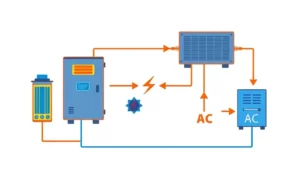What is a Lithium Inverter and Why Should You Consider It? A lithium inverter is a specific type of inverter that uses a lithium battery as its power source. Lithium batteries are known for their high energy density, long lifespan, and fast charging times. This means that lithium inverters can provide backup power for a longer duration and recharge faster than inverters that use lead-acid batteries. Lithium batteries are more environmentally friendly than lead-acid batteries because they don’t contain toxic metals and don’t produce harmful emissions during charging or discharging.


Benefits of Lithium Inverters:
Longer Lifespan: Lithium-ion batteries have a considerably longer lifespan than lead-acid batteries. They can usually last for 7-10 years or around 3000-5000 charging cycles, while lead-acid batteries only last for approximately 2-3 years or 300-500 cycles. This means that there will be fewer replacements and lower overall costs in the long run.
Deeper Discharge Tolerance: Lithium batteries can be discharged to a greater depth (around 80%) without impacting their lifespan as much as lead-acid batteries (which need to stay above 50% charge for optimal lifespan). This allows you to utilize more of the stored energy in lithium batteries, providing more usable backup power during outages.
Faster Charging: Lithium batteries can recharge much faster than lead-acid batteries, minimizing downtime during power cuts. This is crucial for applications where a quick restoration of power is essential.
Lower Maintenance: Lithium batteries require minimal maintenance compared to lead-acid batteries, which need periodic topping up with distilled water to prevent damage.
Lighter Weight and Smaller Footprint: Lithium batteries are generally lighter and more compact than lead-acid batteries of the same capacity. This makes lithium inverters easier to install and handle.
Higher Efficiency: Lithium inverters have a higher conversion efficiency from DC (battery) to AC (mains) power than lead-acid inverters. This translates to less energy wasted during the conversion process.
Why Choose Lithium Over Lead-Acid?
Although lithium inverters have a higher upfront cost compared to lead-acid inverters, they offer numerous advantages that make them a compelling choice in the long run.
What is a Lithium Inverter and Why Should You Consider It?
Advantages of Lithium Batteries:
- Lifespan: The biggest advantage is lifespan. Lithium batteries boast a significantly longer lifespan, lasting 7-10 years or 3000-5000 cycles compared to 2-3 years or 300-500 cycles for lead-acid batteries. This translates to fewer replacements and lower overall costs in the long run.
- Deeper Discharge Tolerance: Lithium batteries can be discharged to a greater depth (around 80%) without significantly impacting their lifespan. Lead-acid batteries, on the other hand, need to stay above 50% charge for optimal health. This allows you to utilize more stored energy in lithium batteries, providing more usable backup power during outages.
- Faster Charging: Lithium batteries can recharge much faster than lead-acid batteries, minimizing downtime during power cuts. This is crucial for applications where a quick restoration of power is essential.
- Lower Maintenance: Lithium batteries require minimal maintenance compared to lead-acid batteries, which need periodic topping up with distilled water to prevent damage.
- Lighter Weight and Smaller Footprint: Lithium batteries are generally lighter and more compact than lead-acid batteries of the same capacity. This makes them easier to install and handle, especially in space-constrained environments.
- Higher Efficiency: Lithium inverters have a higher conversion efficiency from DC (battery) to AC (mains) power than lead-acid inverters. This translates to less energy wasted during the conversion process.
What is a Lithium Inverter and Why Should You Consider It?
Environmental Benefits:
Both types of batteries require proper disposal, but lithium batteries have a lower environmental impact because they last longer. This means that fewer replacements are needed, reducing overall material consumption and waste generation. Lithium inverters offer several environmental benefits compared to traditional lead-acid inverters. Here’s a breakdown of the key advantages:
Reduced Reliance on Fossil Fuels:
- Pairing with Renewables: Lithium inverters are excellent partners for solar power systems. They can efficiently store any excess solar energy produced during the day, enabling you to use clean and renewable power even during power outages. This reduces the need for fossil fuel-powered backup generators, which in turn lowers greenhouse gas emissions and air pollution.
- Improved Grid Stability: The increased adoption of solar power along with lithium inverter storage can play a vital role in stabilizing the electricity grid. Lithium inverters store the excess solar energy during peak production times and supply it during peak demand periods. This reduces the need for power plants to ramp up and down frequently, leading to a more efficient and cleaner energy grid.
Lifespan and Material Reduction:
- Fewer Replacements: As I mentioned earlier, lithium batteries have a much longer lifespan of 7-10 years in comparison to lead-acid batteries which last only 2-3 years. This means that there will be a lot fewer battery replacements required throughout the life cycle of inverters. By reducing the frequency of manufacturing and disposal of batteries, it helps to reduce overall resource consumption and environmental impact.
- Recyclable Materials: Lithium batteries are made up of recyclable materials such as lithium, cobalt, nickel, and copper. Although recycling infrastructure is still developing in some areas, progress is being made to retrieve these valuable materials for use in new batteries. This reduces the need to extract virgin resources, which helps to conserve our natural resources.
- Lower Maintenance Requirements:
- No Water Usage: Lead-acid batteries require periodic topping up with distilled water to prevent damage. Lithium batteries eliminate this requirement, reducing water consumption associated with inverter maintenance.
- Potential Drawbacks to Consider:
- Lithium Mining: The extraction of lithium for battery production can have environmental consequences in some areas if not done responsibly. However, regulations and research are ongoing to minimize the environmental impact of lithium mining.
- Recycling Challenges: While lithium batteries are recyclable, efficient and widespread recycling infrastructure is still under development in some regions. Ensuring proper disposal and recycling of lithium batteries is crucial to maximize their environmental benefits.
- Considering these advantages, lithium batteries are a compelling choice despite their higher upfront cost. The extended lifespan, lower maintenance needs, and improved performance outweigh the initial price difference for many users. Lead-acid batteries Might Still Be Suitable in Some Cases:
- Budgetary Constraints: If upfront cost is the primary concern and reliable backup power for short durations is sufficient, lead-acid batteries might be a viable option.
- Less Demanding Applications: Lead-acid batteries might still be suitable for applications with lower power requirements or less frequent use.
- Lower Total Cost of Ownership: The extended lifespan and lower maintenance needs of lithium batteries can offset the initial cost premium over time.
- Improved Performance: Faster charging, deeper discharge tolerance, and higher efficiency contribute to a more reliable and effective backup power solution.
- Environmentally Friendly: Lithium batteries have a lower environmental impact compared to lead-acid batteries, especially when considering their longer lifespan and reduced need for replacements.
- Are there any drawbacks to Lithium Inverters?
- Higher Initial Cost: As mentioned earlier, lithium inverters typically have a higher upfront cost compared to lead-acid inverters.
- Temperature Sensitivity: Lithium batteries can be more sensitive to extreme temperatures (hot or cold) compared to lead-acid batteries. However, proper thermal management systems in modern lithium inverters mitigate this concern to a great extent.
- Overall, lithium inverters offer a superior solution for backup power needs with their extended lifespan, improved performance, and lower maintenance requirements. While the initial cost might be higher, the long-term benefits outweigh the drawbacks for many users.




